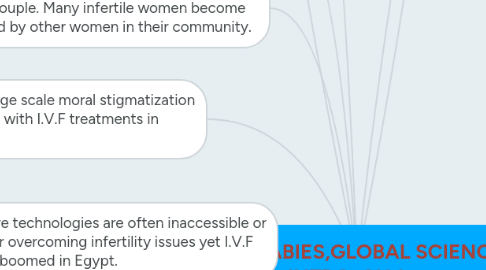LOCAL BABIES,GLOBAL SCIENCE: INTRO, CH 1
by Soraia Maciel

1. Amira "was in hell" because her second husband failed to acknowledge, confront and treat his infertility.
2. Adoption is simply not an alternative for wealthy Egyptian couples, the Qur'an forbids it.
3. I.V.F is a "secret practice" in non-western societies such as the Muslim Middle East.
4. Sunni Islamic culture prohibits 3rd party donation of eggs, sperm, embryo's and uterus.
5. Reproductive technologies are often inaccessible or unhelpful for overcoming infertility issues yet I.V.F clinics have boomed in Egypt.
6. There is large scale moral stigmatization associated with I.V.F treatments in Egypt.
7. In Egypt motherhood is the expected norm for a married couple. Many infertile women become ostracized by other women in their community.
8. Globally there are 50-80 million people dealing with infertility, half of which are Muslim.
9. Reproductive Tract Infections, S.T.D's, and P.I.D are among the most common causes of infertility. Post partum, post abortive complications, and unhygienic health care practices are also major factors.
10. Inhorn describes the "paradox of infertility" where it's presence is often the greatest in areas of the world where fertility is the highest.
11. Gender stigmatization ranks high in societies where motherhood is the only way to increase social staus
12. "Amira" was a 40 year old I.V.F patient in Egypt desperate to have a baby.
13. Married young, her first marriage was an unhappy marriage.
14. Like many newly married couples, there was no use of contraception and as a result she found herself pregnant 4 times.
15. She secretly had abortions for all 4 pregnancies. She found herself having to lie about her marital status in order to have the doctors do the procedures.
16. Amira is Muslim, and truly believes she is being punished by God, for abortions are a sin.
17. Now happily remarried to a kind, wealthy man she was unable to get pregnant.
18. Despite the fact that she only had a 5-7% chance of success, she continued to get expensive I.V.F treatments. Infertility is now "her" problem.
19. Amira and her husband have no social support. In Egyptian culture to admit to male infertility is to appear weak ,therefore his family is unaware of the situation.
20. The globalization of new reproductive technologies collides with the Islamic religion and values of the Muslim people.


